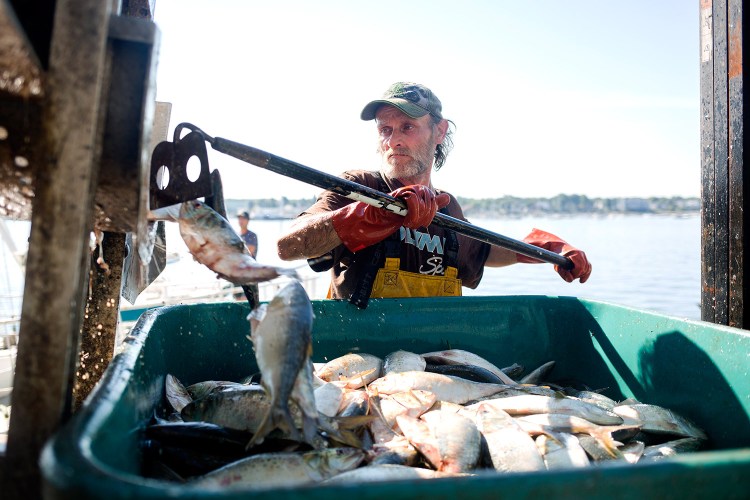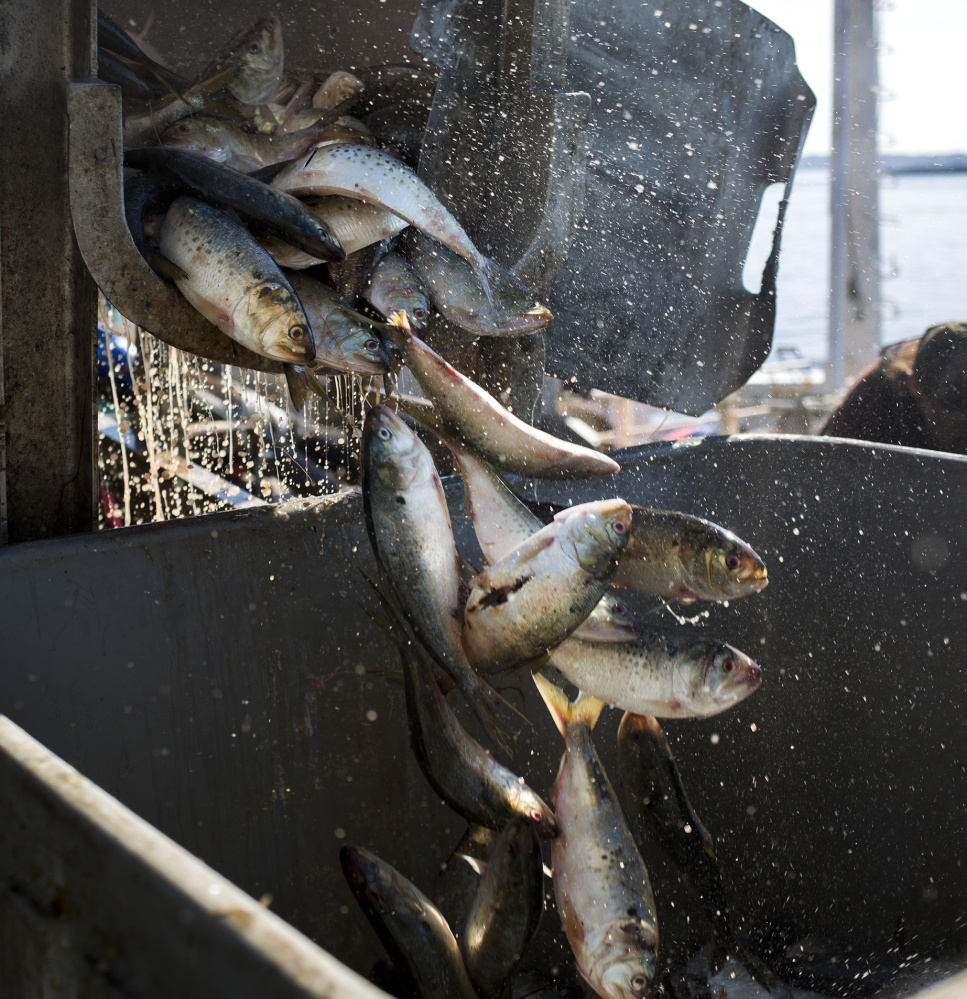In the midst of a bait shortage, Maine has closed down the fishery for lobstermen’s second-favorite type of bait after fishermen exceeded the state’s quota on pogies for the first time.
Despite anecdotal reports of strong lobster landings and prices this season, lobstermen have been struggling to find suitable bait to fill the bags used to lure lobster into their traps.
The offshore supply of fresh Atlantic herring, the go-to bait for most Maine lobstermen, has been in short supply, driving prices up as much 30 percent in late July, the Maine Lobstermen’s Association said. The shortage triggered near-shore fishing restrictions to try to stretch out the summer herring catch in hopes of keeping bait bags full as Maine’s lobster season hits its peak.
With herring getting scarce and expensive, fishermen have turned to other bait for relief, especially the pogie, the local name for Atlantic menhaden. It’s the No. 2 bait fish among Maine lobstermen, according to a state Department of Marine Resources survey.
Maine fishermen have never landed the state’s entire pogie quota, which is set at about 166,000 pounds annually. But this year they had caught all of that and a bit more by July 31, said Megan Ware, head of the menhaden program for the Atlantic States Marine Fisheries Commission, which oversees the pogie catch and other migratory fisheries on the East Coast.
MAINE GETS ITS QUOTA EXPANDED
Because the number of pogies can vary widely from year to year, Maine was eligible to apply for an increased quota if it could prove pogies were in abundant supply in local waters and that it could protect the pogie from overfishing. New York and Rhode Island had met their annual quotas in May, and both applied for and received approval for the extra catch by demonstrating the fishery was growing in local waters, Ware said. Rhode Island flew helicopters over Narragansett Bay to catalog the large schools of pogies that remained after its quota was met, Ware noted.
Maine had no survey data, but pointed to how fast it had met its quota this year as proof that pogies were not being overfished. On July 31, the fisheries commission granted Maine an “episodic event” quota, Ware said, which allowed the state to compete with New York and Rhode Island for an extra 3.7 million pounds of pogies, which is 1 percent of the total allowable catch. On Thursday, just five days after receiving the extra catch allowance, Maine closed the pogie fishery altogether, worried that fishermen might have already used up the allowance, Ware said.
Lobster is Maine’s biggest commercial fishery, with a value of nearly $500 million in landings last year.
CONSUMERS MOSTLY UNAFFECTED
The lobster bait shortage may be hurting lobstermen, but it isn’t hurting consumers. Retail prices remain steady and they aren’t likely to change anytime soon because prices are established by demand, not by the cost of harvesting the lobster, said Annie Tselikis, executive director of the Maine Lobster Dealers Association. Worldwide demand for Maine lobster remains steady and strong, Tselikis said.
“It’s still a very good time for all of us to be in the lobster business,” she said.
Maine has monthly reporting requirements for its pogie fishery, so it can be difficult for state regulators to know exactly how much has been landed on a daily basis. The episodic event quota, however, requires daily reporting from the fishermen and daily catch limits to avoid overfishing. Once the Department of Marine Resources has reviewed all of the landings data, Maine may reopen the fishery if it determines it still has room to land pogies under the episodic cap, said Commissioner Patrick Keliher. The New York and Rhode Island pogie fisheries remain open.
The small silver fish can be found in coastal and estuarine waters from Nova Scotia to northern Florida. It is generally considered too oily for human consumption, but it is prized as a source of Omega 3 fish oil and as bait for many commercial and recreational fish, from shark to striped bass, but especially for lobster and crab. It is also a prime source of food for whales and seabirds.
Environmentalists’ concern about shrinking stock were partly behind the decision by the Atlantic fisheries commission to institute a quota system in 2012. The fishery is believed to be rebounding, however, and the commission voted to increase the quota by 10 percent last year.
The commission’s pogie committee is considering an overall boost in the quota for 2017, but is divided on the size of the increase. That won’t help Maine lobstermen this year.
STILL HOPING FOR MORE HERRING
August is the start of the peak season for lobster harvesting, and right now the industry is hoping herring finally show up in offshore waters. Typically they arrive in June and July.
In its August newsletter, the lobstermen’s association urged members to limit how much herring they use to bait their pots now, in order to keep the supply of herring running through early fall, and to consider using alternative bait, such as pogies. That was written before the pogie fishery closed, however.
Send questions/comments to the editors.





Comments are no longer available on this story